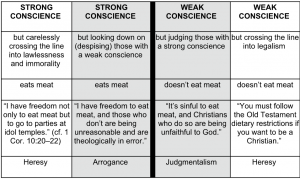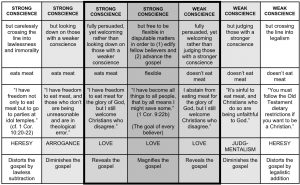The consciences of Christians are remarkably similar, since we all have the same Word and the same Spirit. But on the edges of conscience, God has always allowed Christians a surprising degree of latitude in personal scruples. Paul didn’t command the stricter Christians of Romans 14 to get with the program and start eating meat as Jesus allowed. Nor did he command the meat-eaters to end their carnivorous ways on the outside chance they might upset the vegetarians. He expected them to get along until Jesus returned. (We use weak and strong in reference to the faith or the confidence of one’s conscience to engage in a particular activity [cf Rom. 14:22], not in reference to the strength or the weakness of one’s saving faith.)
But human nature being what it is, the stricter group was always tempted to judge those they saw as too free (“And they call themselves Christians!”), while the free group tended to look down on those with unnecessary restrictions (“those poor legalists!”). Fortunately, Paul condemned both attitudes.
But disunity isn’t the only danger. Arrogance and overconfidence among the strong made them ripe for a kind of sin-all-you-want heresy called antinomianism. Meanwhile, the judgmentalism of the stricter believers tended to push them into the legalistic heresy of the Judaizers.
None of these four attitudes on conscience disagreements pleased God; in fact, two of them were outright heretical:
Satan had his axe poised to take advantage of this natural split. What would be Paul’s glue to go into that gap and hold these churches together in the midst of conscience disputes? It would be the glue of Christian love as articulated in Romans 14 and 1 Corinthians 8–10. The chart below inserts Paul’s threefold solution of love into the growing split that threatened the early churches. Take time to look carefully at Paul’s solution of love that leads to unity:
The three center columns are derived mainly from Paul’s brilliant, Spirit-inspired analysis of conscience disagreements in Romans 14 and 15. In these two chapters, Paul offers 12 principles to ensure the strict consciences of the weak would be respected, while still allowing for the legitimate freedoms of the strong.
Here they are.
1. Welcome those who disagree with you (Rom. 14:1–2).
“As for the one who is weak in faith, welcome him, but not to quarrel over opinions [NIV: “without quarreling over disputable matters”]. One person believes he may eat anything, while the weak person eats only vegetables.”
By now you’ve probably already put yourself into a “strong conscience” or “weak conscience” box. But the fact is, in most issues, you’re probably both weak and strong at the same time in comparison to others. There are almost always people to your left and right on any given disputable matter. This means that, depending on the situation, God will call you to obey Paul’s exhortations both to the weak and to the strong.
2. Those who have freedom of conscience must not look down on those who don’t (Rom. 14:3–4).
“Let not the one who eats despise [NIV: “treat with contempt”] the one who abstains, and let not the one who abstains pass judgment on [i.e., be judgmental toward] the one who eats, for God has welcomed him. Who are you to pass judgment on the servant of another? It is before his own master that he stands or falls. And he will be upheld, for the Lord is able to make him stand.”
Isn’t this always the temptation of the strong, to look down on and despise the strict “legalists”? Paul condemns this attitude of superiority.
3. Those whose conscience restricts them must not be judgmental toward those who have freedom (Rom. 14:3–4).
And isn’t this always the temptation of those with a weaker conscience on a particular issue, to pass judgment on those “antinomians”?
Why are these attitudes so wrong? Paul gives two reasons:
1. “God has welcomed him” (14:3c). Are you holier than God?
2. “Who are you to pass judgment on the servant of another?” (14:4a). You are not the master of other believers.
We’re not saying these third-level issues are unimportant. It’s okay to talk about them, and even preach about them. It’s okay to tweet and blog about them. But with at least two conditions: Have the right spirit, and have the right proportion.



